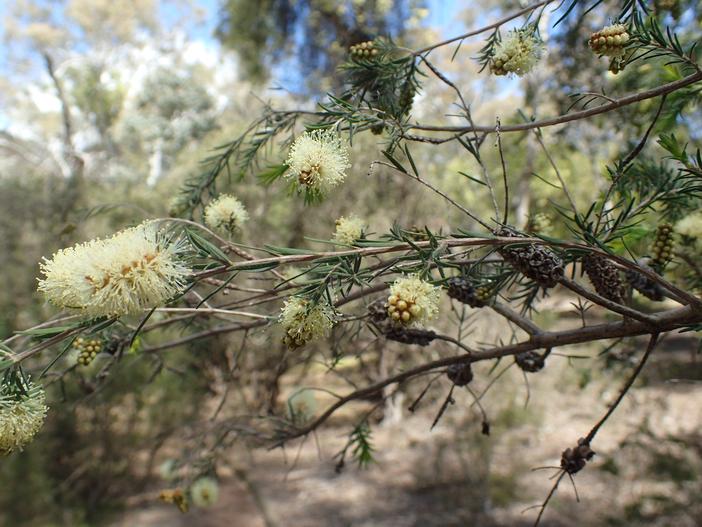Gray Honey-Myrtle
(Melaleuca incana)
Gray Honey-Myrtle (Melaleuca incana)
/
/

Geoff Derrin
CC BY-SA 4.0
Image By:
Geoff Derrin
Recorded By:
Copyright:
CC BY-SA 4.0
Copyright Notice:
Photo by: Geoff Derrin | License Type: CC BY-SA 4.0 | License URL: https://creativecommons.org/licenses/by-sa/4.0 | Uploader: Gderrin | Publisher: Wikipedia Commons















Estimated Native Range
Summary
Melaleuca incana, commonly known as Gray Honey-myrtle, is a shrub or small tree endemic to coastal and near-coastal areas in the Southwest Australia. It has also become naturalised in southern Victoria, Australia. This species is part of the diverse Myrtaceae family, which includes many plants with essential oils. Melaleuca incana typically grows to about 5 meters (16 feet) in height and features fibrous or flaky bark. Its foliage is notable for its silvery-grey color, which provides a beautiful contrast in the garden. The flowers are arranged in dense spikes at the ends of branches, with each spike containing 6 to 55 individual flowers. The flowers are white, creamy white, or yellow, and can be highly scented, adding to their appeal. Flowering occurs mainly in spring, and the showy blooms are followed by woody capsules that cluster together, resembling small cylinders.
Gray Honey-myrtle is valued for its ornamental flowers, which attract pollinators, and its ability to adapt to a variety of garden settings. It is often used for hedging due to its dense growth habit and responds well to pruning. This plant is fast-growing and frost-hardy, making it suitable for a range of climates. It thrives in full sun to part shade and prefers soils with medium drainage, although it can tolerate a range of soil types once established. Regular pruning can help maintain its shape and promote denser foliage. While generally low-maintenance, it can be susceptible to scale insects, which gardeners should monitor for.CC BY-SA 4.0
Gray Honey-myrtle is valued for its ornamental flowers, which attract pollinators, and its ability to adapt to a variety of garden settings. It is often used for hedging due to its dense growth habit and responds well to pruning. This plant is fast-growing and frost-hardy, making it suitable for a range of climates. It thrives in full sun to part shade and prefers soils with medium drainage, although it can tolerate a range of soil types once established. Regular pruning can help maintain its shape and promote denser foliage. While generally low-maintenance, it can be susceptible to scale insects, which gardeners should monitor for.CC BY-SA 4.0
Plant Description
- Plant Type: Shrub
- Height: 6-10 feet
- Width: 6-12 feet
- Growth Rate: Rapid
- Flower Color: Yellow, White
- Flowering Season: Spring, Summer
- Leaf Retention: Evergreen
Growth Requirements
- Sun: Full Sun, Part Shade
- Water: Medium
- Drainage: Fast, Medium
Common Uses
Bee Garden, Bird Garden, Butterfly Garden, Fragrant, Hedges, Hummingbird Garden, Low Maintenance, Potted Plant, Showy Flowers, Street Planting
Natural Habitat
endemic to coastal and near-coastal areas in the Southwest Australia
Other Names
Common Names: Grey Honey-Myrtle
Scientific Names: , Melaleuca incana,
GBIF Accepted Name: Melaleuca incana R.Br.